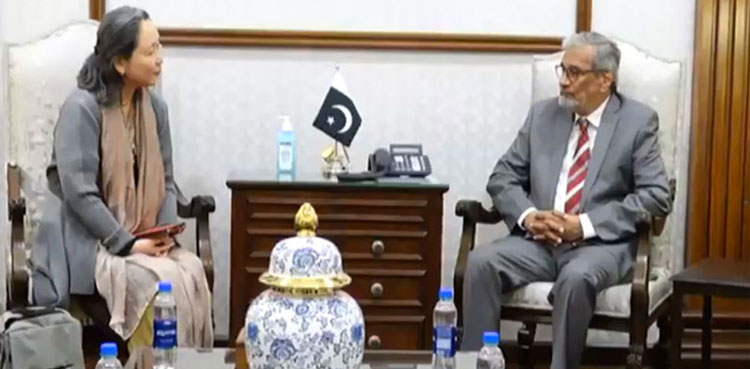180 more electric buses to be inducted on Sindh BRT routes
- By Sanjay Sadhwani -
- Dec 08, 2023

The Asian Development Bank (ADB) has assured the Sindh government of funding for more electric buses for Bus Rapid Transport (BRT) feeder routes, ARY News reported on Friday.
A high-level delegation of the Asian Development Bank (ABD) led by Principal Director F Cleo Kawawaki met the Sindh Caretaker Chief Minister (CM) Justice Retired Maqbool Baqar today.
They exchanged views on different public-private partnership projects. In the meeting, they discussed new areas of potential collaboration, including nature-based solutions, urban development, and mobility, that have embedded digitisation solutions and contribute towards the development of carbon markets.
Related: Karachi electric bus likely to shutdown
Sindh Caretaker CM Maqbool Baqar said that the government intends to run electric buses on the BRT feeder routes to reduce pollution.

The induction of more electric buses on BRT routes will also benefit around 50,000 commuters on a daily basis, whereas, a feasibility report of the project was also prepared by the Sindh government, he added.
Chairman P&D Shakil Mangejo told the ADB head that the Green and Orange Lines have been implemented in Karachi to facilitate estimated passenger traffic of 50,000 per day, according to a press release issued today.
With the induction of feeder route buses, existing and future lines will be integrated which will contribute towards the long-term sustainability of the overall system.
Secretary Transport said that under the project 170-180 electric buses would be inducted into the existing BRT routes of Green and Orange Line. Partial electricity generation through solarization under a wheeling mechanism could help reduce operating costs targeted to be covered through tariff and non-tariff with no requirement for operational subsidy.
CM Baqar also informed the ADB delegation about the planned installation of a wastewater recycling plant in Karachi’s Haroonabad – a neighbourhood in SITE town – in another step to curb pollution.
The plant will have the capacity to treat 120 MGD wastewater from TP-4.
The recycling plant project will significantly reduce carbon emissions besides fulfilling the industrial demand.
The cost of the project would be around $400 million, of which the World Bank, ADB and Sindh government would finance $230 million, and the remaining amount would be taken as a loan from the banks.
The Karachi Water and Sewerage Board (KWSB) mandated the ADB to be the transaction advisor about an unsolicited proposal for a treatment plant at Haroonabad near Sindh Industrial Trade Estate (SITE).
A market survey shows that the present water demand of industries in SITE is 40-50 MIGD. Due to water shortage, KWSB is only able to supply around 2-3 MIGD.
As per the proposal a full vertically integrated wastewater treatment system with supply, delivery, and billing. The first project to have a recording of Carbon Emission Reduction through technology. RFQ for the project has been completed whereas the RFP is expected to be launched by the first week of December 2023.
TP-IV is the biggest project for wastewater treatment in Karachi with a treatment capacity of 120 MIGD and is expected to double, in future after the successful launch of TP-IV.
The project includes the connection of more than 30 sewerage conduits (municipal only) which are expected to bring wastewater via the interceptor to the TP4.
ADB Principal Director F Cleo Kawawaki assured CM Baqar of the bank’s maximum financial cooperation to materialise the electric buses and recycling plant projects.
